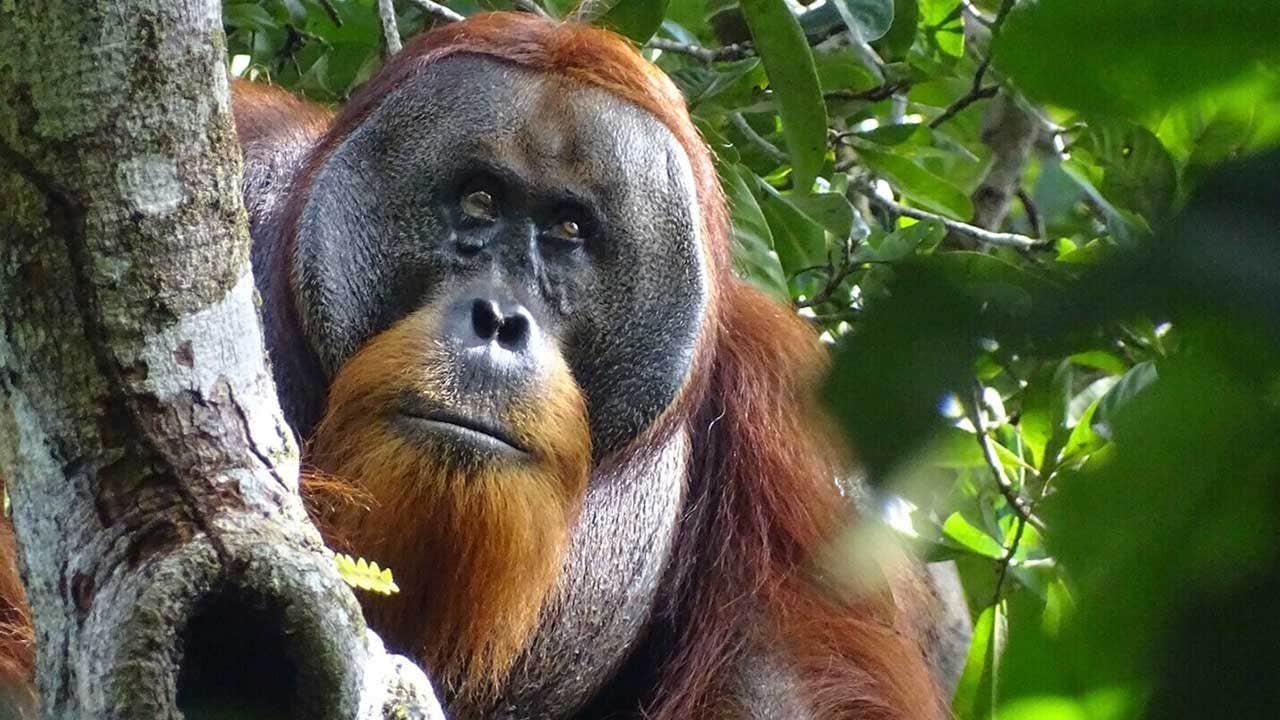An orangutan appeared to treat a wound with medicine from a tropical plant — the latest example of how some animals attempt to soothe their own ills with remedies found in the wild, scientists reported Thursday.
Scientists observed Rakus, a wild male Sumatran orangutan in Gunung Leuser National Park, Indonesia, pluck and chew up leaves of a medicinal plant used by people throughout Southeast Asia to treat pain and inflammation. The orangutan then used his fingers to apply the plant juices to an injury on the right cheek. Afterward, he pressed the chewed plant to cover the open wound like a makeshift bandage, according to a new study in Scientific Reports.
Previous research has documented several species of great apes foraging for medicines in forests to heal themselves, but scientists hadn’t yet seen an animal treat itself in this way.
ZOO JOY: HEARTS MELT WHEN ORANGUTAN ‘ASKS’ TO SEE BABY THROUGH ENCLOSURE, THEN ‘KISSES’ GLASS
“This is the first time that we have observed a wild animal applying a quite potent medicinal plant directly to a wound,” said co-author Isabelle Laumer, a biologist at the Max Planck Institute of Animal Behavior in Konstanz, Germany.
The orangutan’s intriguing behavior was recorded in 2022 by Ulil Azhari, a co-author and field researcher at the Suaq Project in Medan, Indonesia. Photographs show the animal’s wound closed within a month without any problems.
Rakus, a wild male Sumatran orangutan in Gunung Leuser National Park, Indonesia, is seen on Aug. 25, 2022. The photo was taken after he used medicinal plants to treat a facial wound, which was barely visible after the treatment. (Safruddin/Suaq foundation via AP)
Scientists have been observing orangutans in Indonesia’s Gunung Leuser National Park since 1994, but they hadn’t previously seen this behavior.
“It’s a single observation,” said Emory University biologist Jacobus de Roode, who was not involved in the study. “But often we learn about new behaviors by starting with a single observation.”
“Very likely it’s self-medication,” said de Roode, adding that the orangutan applied the plant only to the wound and no other body part.
MISSOURI ZOO WELCOMES NEWBORN BORNEAN ORANGUTAN JUST BEFORE MOTHER’S DAY
It’s possible Rakus learned the technique from other orangutans living outside the park and away from scientists’ daily scrutiny, said co-author Caroline Schuppli at Max Planck.
Rakus was born and lived as a juvenile outside the study area. Researchers believe the orangutan got hurt in a fight with another animal. It’s not known whether Rakus earlier treated other injuries.
Scientists have previously recorded other primates using plants to treat themselves.
Bornean orangutans rubbed themselves with juices from a medicinal plant, possibly to reduce body pains or chase away parasites.
CLICK HERE TO GET THE FOX NEWS APP
Chimpanzees in multiple locations have been observed chewing on the shoots of bitter-tasting plants to soothe their stomachs. Gorillas, chimpanzees and bonobos swallow certain rough leaves whole to get rid of stomach parasites.
“If this behavior exists in some of our closest living relatives, what could that tell us about how medicine first evolved?” said Tara Stoinski, president and chief scientific officer of the nonprofit Dian Fossey Gorilla Fund, who had no role in the study.
